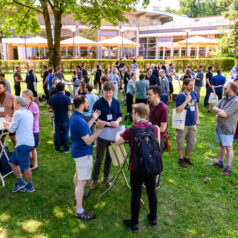Keys to Success

Networks and Cooperation

The Excellence Strategy has provided stimuli for establishing cooperations and building networks. Statistics show that funding has facilitated cooperation between different actors in the German higher education landscape. On a regional level, this applies to collaborations among neighbouring universities, but also with other research institutions as well as with industry and the public at large. Several examples of knowledge transfer to companies and the public at large illustrate the results of these collaborations, such as transfer labs, clinical demonstrators, patent applications, spin-offs and start-ups. The close interaction between those funded under the Excellence Strategy with other university and non-university actors in Germany also demonstrates the broad impact of the funding.
As a result of the Excellence Strategy, research in Germany has become even more visible internationally. Clusters of Excellence have recruited more international researchers than the German average – this is shown by the DFG Funding Atlas 2021, for example. The Universities of Excellence have broadened their networks by strategically expanding their international collaborations with universities in Europe and globally.

Diversity and Early Career Support

The “ExStra atmosphere” fosters excellent research. Committed and bright minds are crucial here. The seal of quality “funded under the Excellence Strategy” attracts researchers from abroad as well as talented early-career researchers who enjoy the very best conditions and enrich research with fresh ideas. After the initial phase, PhD students are the largest group of employees in almost all Clusters of Excellence.
Diversity in terms of age, origin and other dimensions is a key factor contributing to scientific excellence. This is especially true of projects and measures funded under the Excellence Strategy and is reflected in the large number of international researchers from a wide range of home countries as well as the ratio of 26 percent female professors working in Clusters of Excellence – an increase of 7 percent compared to Clusters of Excellence funded under the “Excellence Initiative”.

Public Engagement
Projects funded under the Excellence Strategy can apply for funds for public engagement and science communication. Clusters of Excellence and Universities of Excellence share their findings with interested citizens in various ways. The activities are as diverse as the funded projects and institutions themselves, their profiles and scientific interests. A wide range of science communication measures are pursued, including laboratories for schoolchildren, exhibition projects, participation in “Long Night of Science” events and lecture series for the general public.
One example
In the podcast series “Exzellent erklärt” researchers tell about their research in Clusters of Excellence (in German, on Podigee).
